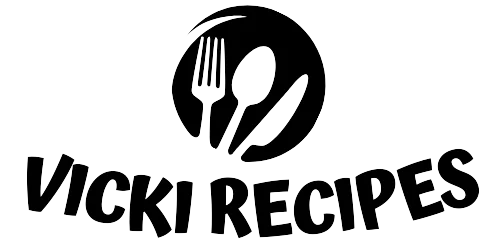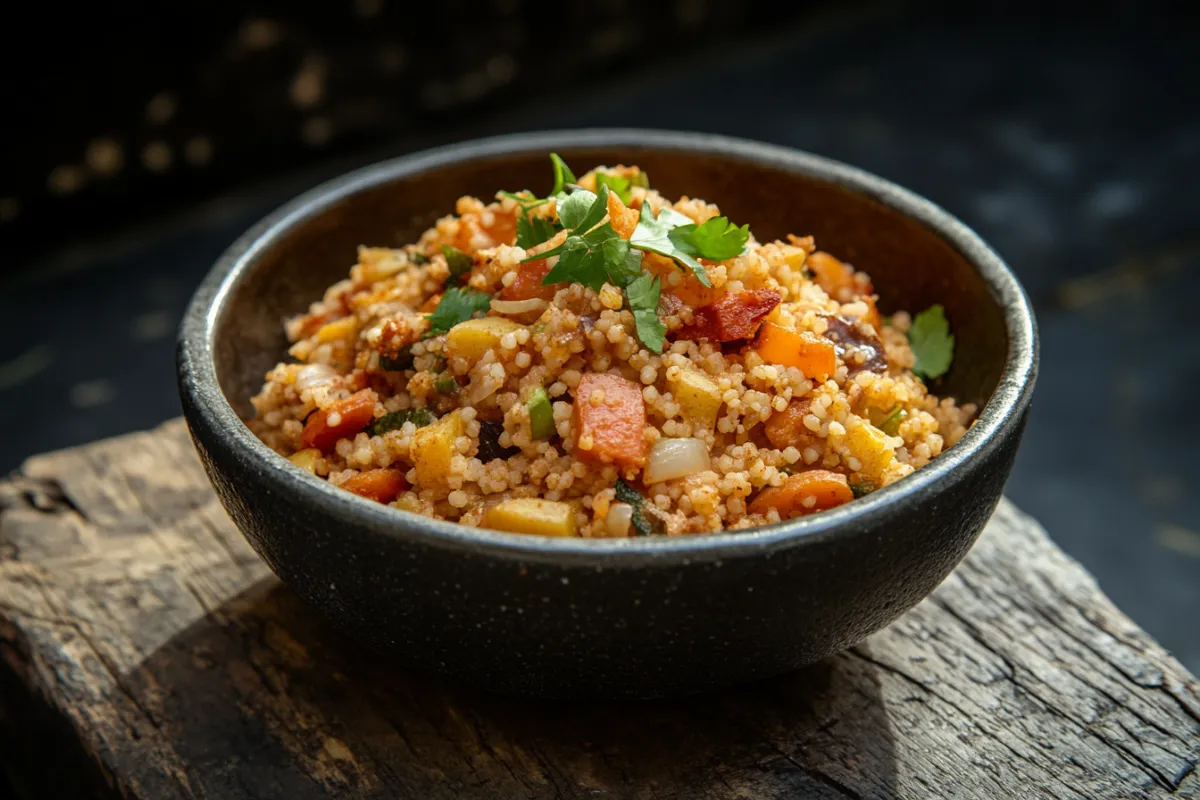I’m often asked if couscous is free of gluten. This is especially important for those with celiac disease or on a free of gluten diet. In this article, we’ll explore couscous’s ingredients, origins, and if it’s safe for free of gluten diets.
Couscous is a key food in North African and Middle Eastern dishes. It’s not a grain but a pasta made from semolina, a wheat type. So, traditional couscous isn’t free of gluten, as it has wheat proteins that those with celiac disease or gluten sensitivity must avoid.
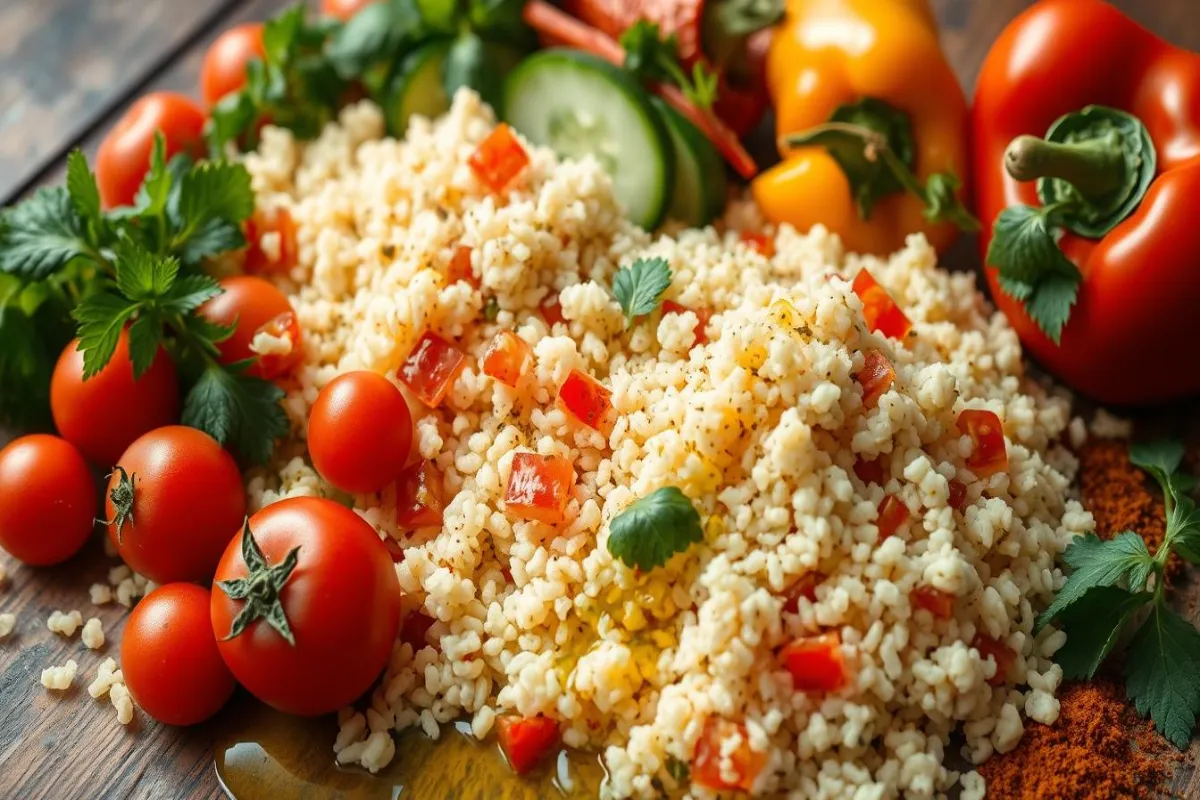
But, there’s good news. Gluten-free couscous alternatives have been made from grains like millet, quinoa, and cauliflower. These options mimic traditional couscous’s taste and texture, making them great for free of gluten diets.
We’ll look into couscous’s free of gluten potential and the differences between whole wheat and free of gluten types. We’ll also discuss its nutritional profile and risks for those with celiac disease or gluten sensitivity. By the end, you’ll know if couscous is safe and right for your diet.
Exploring the Gluten-Free Potential of Couscous
Couscous is a dish from North Africa that’s loved worldwide. But, its ingredients make some wonder if it’s free of gluten. As someone who loves nutrition and follows a free of gluten diet, I’m eager to learn more about couscous. I want to see if it’s safe for those with gluten sensitivity.
Understanding Couscous Ingredients and its Origins
Couscous is made from semolina, a wheat flour type. This means traditional couscous has gluten, which is a problem for those on a free of gluten diet. It comes from North Africa, where it’s been a key food for ages. It’s often eaten as a side or as the base for tasty stews and tagines.
| Ingredient | Gluten Content |
|---|---|
| Semolina (Traditional Couscous) | Contains Gluten |
| Whole Grain Couscous | Contains Gluten |
| Grain-Free Couscous Alternatives | Gluten-Free |
Evaluating Couscous for Gluten Sensitivity
For those with gluten sensitivity or celiac disease, traditional couscous is a big issue. But, there are free of gluten options like grain-free couscous made from cauliflower or quinoa. Knowing what’s in your couscous and choosing whole grain couscous can help those with gluten concerns.
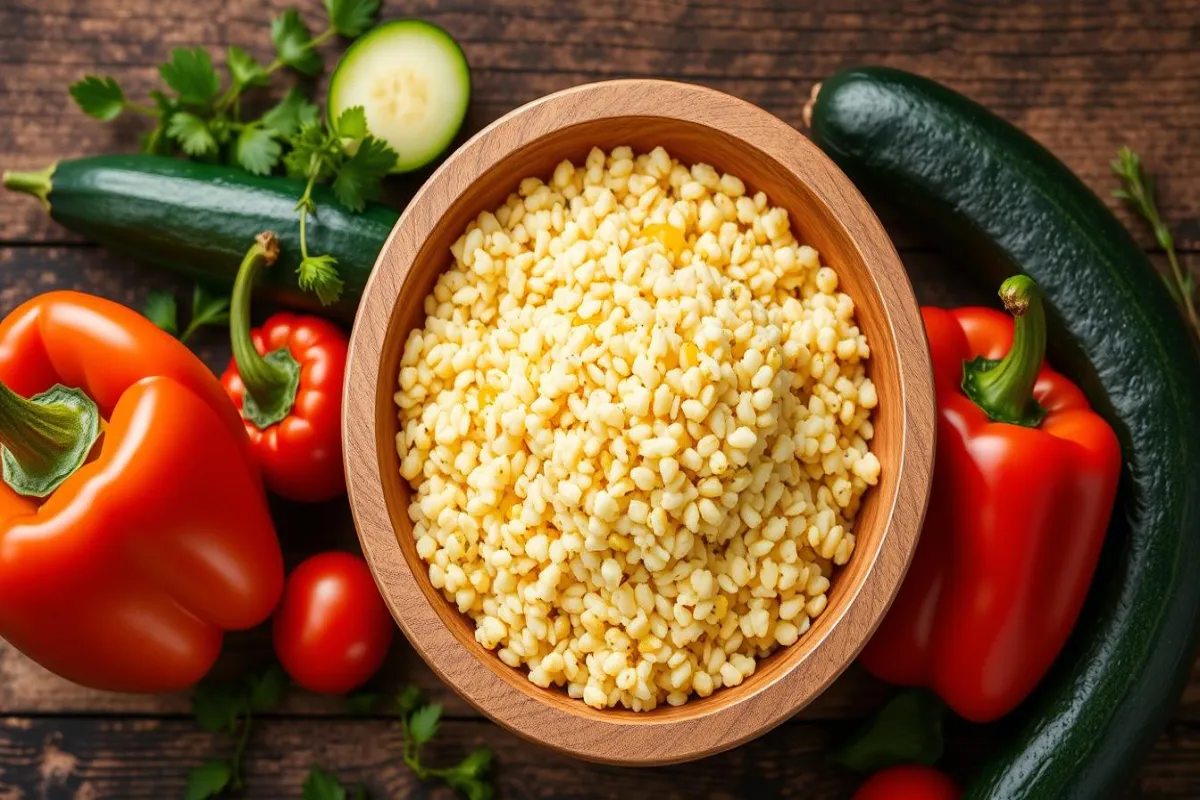
“Couscous is a staple in many cuisines, but its gluten content can be a concern for those with dietary restrictions. Exploring alternative options and understanding the origins of this beloved dish can help us make more informed decisions about incorporating it into a gluten-free lifestyle.”
Couscous: A Grain or a Pasta?
Many people wonder if couscous is a grain or pasta. This question is key to understanding if it’s free of gluten. Let’s dive into this to see if couscous is safe for those avoiding gluten.
Couscous is not a grain, but a pasta. It’s made from semolina flour, which comes from durum wheat. So, traditional couscous has gluten. But, there are free of gluten couscous options made from millet, sorghum, or quinoa.
The confusion comes from how couscous looks and is cooked. It’s steamed like grains but is made from wheat flour. This makes it a pasta. Knowing this is crucial for those with gluten sensitivities or celiac disease.
“Couscous is often mistaken for a grain, but it is actually a type of pasta.”
In short, couscous looks like a grain but is a wheat-based pasta. So, regular couscous isn’t free of gluten. But, there are free of gluten couscous options for those on a gluten-free diet.
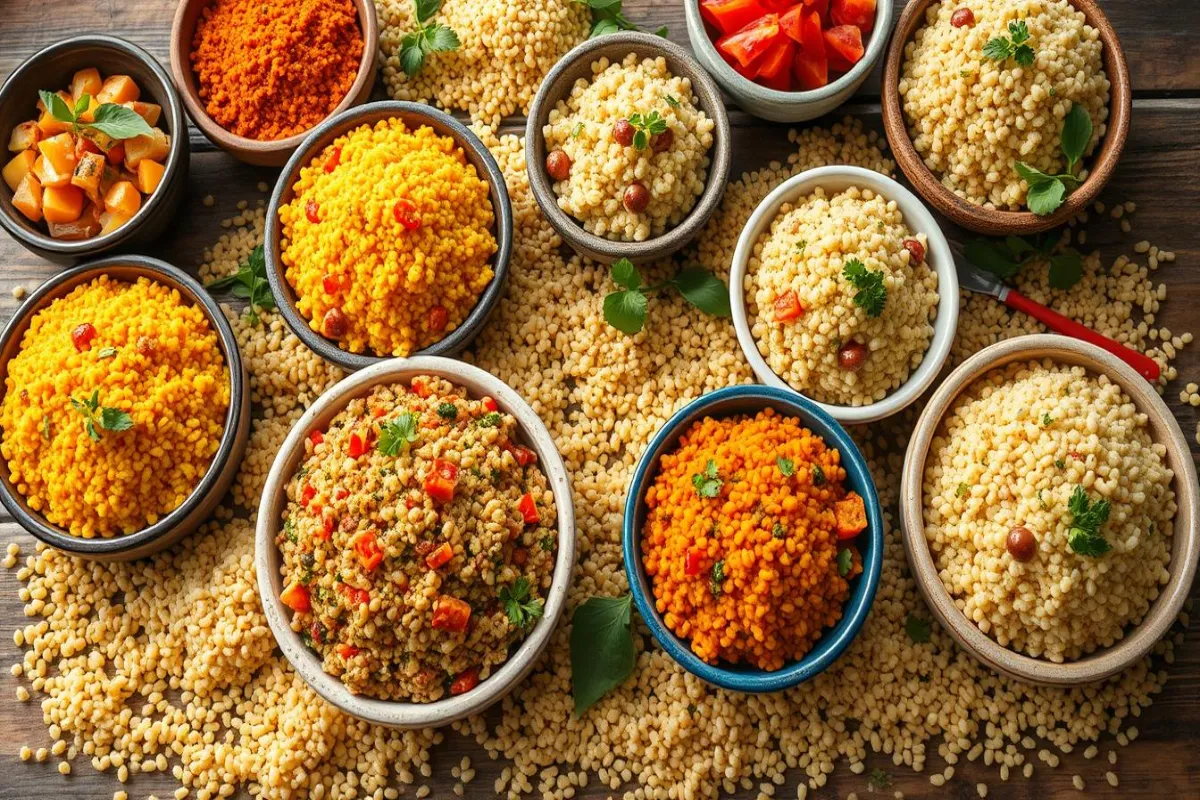
The Gluten-Free Dilemma: Is Couscous Gluten-Free?
As we explore couscous, a big question comes up: is it gluten-free? The answer might surprise you. The gluten-free status of couscous is a topic of debate and confusion.
Couscous is made from semolina, which comes from wheat. So, traditional couscous has gluten. But, the way it’s made and the types available can change its gluten content.
Some makers have created gluten-free couscous from millet, sorghum, or quinoa. These are great for those with gluten sensitivities or on a strict gluten-free diet. But, finding and knowing these products can be tricky. It’s key to check labels carefully.
“The gluten-free status of couscous can be a confusing and often misunderstood topic. It’s important to do your research and choose the right product to meet your dietary needs.”
We’ll look closer at is couscous gluten free in the next parts. We’ll explore different couscous types, their ingredients, and cross-contamination risks. By then, you’ll know if couscous fits into a gluten-free diet.
Varieties of Couscous: Whole Wheat vs. Gluten-Free
Couscous is a staple in many cuisines, available in whole wheat and gluten-free forms. Knowing the differences is key, especially for those with gluten sensitivities. Let’s explore whole grain couscous and gluten-free options for a gluten-free diet.
Decoding the Nutrition Facts of Whole Wheat Couscous
Whole wheat couscous is packed with nutrients. It’s a great source of whole grain couscous, offering fiber, B vitamins, and minerals like magnesium and selenium. It keeps more of the grain’s natural goodness than refined couscous, making it a healthier choice.
Discovering Gluten-safe Couscous Alternatives
For those on a gluten-free couscous diet, there are many alternatives. Options include couscous nutrition like millet, quinoa, or cauliflower. These alternatives offer a similar taste and texture, perfect for those with gluten sensitivities or celiac disease.
| Whole Wheat Couscous | Gluten-Free Couscous Alternatives |
|---|---|
|
|
The choice between whole wheat couscous and gluten-free alternatives depends on your dietary needs. Exploring these options can help you find the perfect fit for your lifestyle and taste preferences.
Celiac Disease and Couscous: What You Need to Know
For those with celiac disease or a wheat allergy, knowing if couscous is gluten-free is key. It’s important to understand the risks and take steps to stay safe. This way, you can enjoy your meals without worry.
Understanding the Risks of Gluten Exposure
Celiac disease makes the body react to gluten in wheat, rye, and barley. This reaction damages the small intestine. Even a little gluten can cause problems like stomach pain, bloating, and malnutrition.
People with a wheat allergy also need to be careful with couscous. It’s made from wheat and can cause allergic reactions. Symptoms can include hives, trouble breathing, and more.
- Celiac disease: An autoimmune disorder where gluten consumption damages the small intestine
- Wheat allergy: An allergic reaction to the proteins found in wheat, including those in couscous
- Potential symptoms: Abdominal pain, bloating, malnutrition, hives, difficulty breathing
Those with these conditions must watch what they eat closely. They should look for gluten-free or wheat-free couscous options. With the right knowledge, they can enjoy couscous safely.
Gluten-Free Couscous Brands and Products
If you’re on a gluten-free diet and want to try couscous, you’re in luck. There are many gluten-free couscous brands and products out there. I’ll give you a rundown of some top choices to help you decide.
Bobs Red Mill is a leading brand in this matter. They have products like Organic Gluten-Free Couscous, made from millet and quinoa. Trader Joe’s also offers a Gluten-Free Couscous, a mix of corn and rice.
Tinkyada has a Gluten-Free Whole Grain Couscous made from brown rice and millet. It’s a healthy choice that tastes great and has the same texture as regular couscous.
- Bobs Red Mill Organic Gluten-Free Couscous
- Trader Joe’s Gluten-Free Couscous
- Tinkyada Gluten-Free Whole Grain Couscous
When picking a no gluten couscous, always check the labels. Look for products that are certified gluten-free or made in facilities that avoid gluten. This ensures the couscous is safe for you to eat.
Exploring these free of gluten couscous options lets you enjoy its delicious taste while sticking to your diet. Try different brands and recipes to find the one that fits your taste and dietary needs best.
Cooking and Serving Gluten-Free Couscous
Gluten-free couscous is a bit different from the traditional kind. But with the right techniques, you can make tasty free of gluten dishes. Here, I’ll share some tips and recipes to help you enjoy this versatile grain.
Delicious Gluten-Free Couscous Recipes
Gluten-free couscous is great for many recipes. Here are some of my favorite dishes:
- Herb-Infused Free of Gluten Couscous Salad: Mix cooked free of gluten couscous with veggies, herbs, and a tangy dressing for a tasty side.
- Moroccan-Style No Gluten Couscous: Cook onions, garlic, and spices in oil. Then add free of gluten couscous and broth for a flavorful main dish.
- Gluten-Free Couscous with Roasted Vegetables: Roast veggies in the oven. Then mix them with cooked free of gluten couscous for a healthy meal.
When cooking free of gluten couscous, follow the package instructions closely. It might need more liquid than regular couscous. So, watch the consistency and add more broth or water if it’s too dry.
| Recipe | Prep Time | Cook Time | Servings |
|---|---|---|---|
| Herb-Infused Gluten-Free Couscous Salad | 15 minutes | 20 minutes | 4 |
| Moroccan-Style Gluten-Free Couscous | 20 minutes | 30 minutes | 6 |
| Gluten-Free Couscous with Roasted Vegetables | 25 minutes | 40 minutes | 4 |
By following these tips and trying these no gluten couscous recipes, you can enjoy its texture and flavor. And you’ll stay true to your no gluten lifestyle. Bon appétit!
Couscous Substitutes for a Gluten-Free Diet
Looking for free of gluten options can be tough. But, there are many grain-free and free of gluten choices out there. They can meet your dietary needs and satisfy your taste buds.
Quinoa is a great alternative to couscous. It’s free of gluten and full of protein, fiber, and vitamins. Its light texture and mild taste make it perfect for salads and pilafs.
Cauliflower rice is another popular choice. It’s made by pulsing cauliflower in a food processor. This creates a rice-like texture that’s great in place of couscous.
- Millet: This small, nutty grain is a good couscous substitute. It’s gluten-free and versatile.
- Buckwheat: It’s not wheat, but a free of gluten pseudocereal. It can be used as a couscous substitute.
- Finely chopped nuts or seeds: For a protein-rich option, try using almonds or sunflower seeds. They make great couscous substitutes.
| Without Gluten Couscous Substitute | Nutrition Highlights | Culinary Uses |
|---|---|---|
| Quinoa | High in protein, fiber, and essential nutrients | Salads, pilafs, side dishes |
| Cauliflower Rice | Low in carbs, high in vitamins and minerals | Stir-fries, rice dishes, side dishes |
| Millet | Gluten-free, high in fiber and minerals | Porridge, pilafs, side dishes |
These substitutes offer tasty and nutritious options for a free of gluten diet. Try them out to find your new favorite dishes.
“Embracing a gluten-free diet doesn’t mean sacrificing flavor or variety. These couscous substitutes offer delicious and nutritious alternatives that can satisfy your cravings while keeping your gut happy.”
Is Couscous Gluten-safe? The Final Verdict
After looking into couscous and gluten, I can say this: it can be glutenless, but it depends on the type and how it’s made.
Couscous is a key dish in North African food. It’s often made from semolina, which comes from wheat and has gluten. But, there are no gluten couscous options made from grains like millet, sorghum, or quinoa.
To know if couscous is glutenless, check the ingredients and labels. Look for “gluten-free” labels or confirm it’s made from non-wheat grains. Talking to the maker can also help a lot.
| Couscous Type | Gluten-Free? |
|---|---|
| Semolina-based Couscous | No |
| Glutenless Couscous (made from millet, sorghum, or quinoa) | Yes |
If you’re gluten-sensitive or have celiac disease, choose certified glutenless couscous. This ensures it’s made in a safe place and meets strict standards.
“When it comes to couscous, the key is to read the labels carefully and choose a no gluten variety if you have any concerns about gluten intake.”
In short, couscous’s free of gluten status can change. But, with the right info, those on a no gluten diet can still enjoy it.
Conclusion
The question of whether couscous is celiac-safe is complex. Couscous is often made from semolina, a wheat flour type. But, there are no gluten options for those with celiac disease or gluten sensitivity.
I looked into couscous’s ingredients and origins. I also compared whole wheat. This helps those with dietary restrictions make better choices.
It’s important to read labels carefully and talk to healthcare professionals. This way, you can see if couscous fits your diet. There are many alternatives and substitutes. This means everyone can enjoy couscous’s flavors and textures.
FAQ
Is couscous celiac-safe?
No, traditional couscous is not celiac-safe. It’s made from semolina, a wheat flour that has gluten. But, there are glutenless options made from grains like quinoa or millet.
What are the ingredients in couscous?
Couscous is made from semolina, a wheat flour. It’s steamed and then rolled into small granules. This gives couscous its unique texture. Traditional couscous doesn’t include other grains, making it not suitable for a no gluten diet.
Can people with celiac disease eat couscous?
No, people with celiac disease should avoid traditional couscous. It has gluten from wheat semolina. Gluten can harm those with celiac disease, damaging their small intestine. They should choose glutenless alternatives grains.
What is the difference between whole wheat and no gluten couscous?
Whole wheat is made from whole grain semolina, which has gluten. It’s not good for a free of gluten diet. No gluten couscous, however, is made from grains like quinoa, millet, or corn. It’s celiac-safe and offers a similar texture to traditional one.
What are some good no gluten couscous alternatives?
Here is some alternatives, consider these options:
– Quinoa
– Millet
– Buckwheat
– Cauliflower
– Rice-based
These alternatives have a similar texture but are safe for a free of gluten diet.
